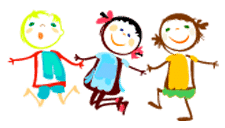
I Cycle Infant 1 and 2 years

I Infant Cycle
1 and 2 years
Conoce nuestra etapa de 1 año
Conoce nuestra etapa de 2 años
DEVELOPMENTAL DEVELOPMENT I INFANTILE CYCLE 1 and 2 years old
This age is basically oriented to establish relationships with the outside world. Now the child will adapt to new situations, not only using already acquired schemes, but looking for and finding new means.
His great energy and activity lead him to start conquering his autonomy, he will begin to stand upright, take his first steps... with increasing confidence. Walking will allow children to orient themselves in space and manipulate the objects around them, which will help them to get to know their environment better and better.
At the end of the first year, his attitude towards cleanliness will be consolidated in this year, since he will begin to control his sphincters. It will not be necessary to impose these cleaning habits, but we will help him to form them. For this, and for this attitude to be positive, the play with elements such as sand, mud, water... will be facilitated, leaving him/her free to explore.
DEVELOPMENTAL DEVELOPMENT BETWEEN 2 and 3 YEARS OF AGE
From the age of 2, the child's nervous system reaches the necessary maturity to access new learning, better coordinate its movements, etc... Although it has not yet achieved the ability to stop the action and its will.
In this stage "no" emerges as an organizer of behavior. It is the stage of denial in front of everything. Also in front of food: this can turn the moment of eating into a "really hard act".
We will keep in mind that "touching" is a normal need in their development and food will also be included in this sense, so we will try, as far as possible, to be somewhat permissive in this regard.
Touching is a normal developmental need.
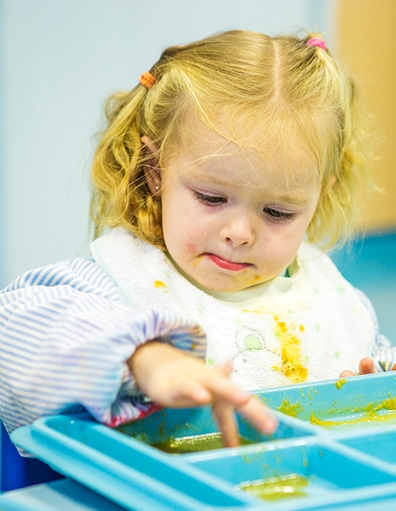
A new acquisition will signal an important advance in the child's autonomy, as a result of its maturity. Daytime sphincter control will begin to take place, and at around the age of 2 and a half years, nighttime as well.
The child, between 1 and 2 years old, plays alone or together with another child, in parallel. He does not yet know how to share his games and toys with other children. During this time, the child will frequently switch from one activity to another, although the so-called "large motor activities" will predominate: running, climbing, crawling, etc.
At this "magical age" the child will believe everything he is told. Therefore, we must not abuse his credulity: we never threaten him with the presence of evil characters, nor with our abandonment or loss of our affection. The child is really afraid of being abandoned. Fear should not be used to make him desist from those "not convenient" behaviors.
HOW TO AVOID THE BAN?
Our facilities are prepared so that they can develop their progress avoiding dangers, in order to avoid the use of unnecessary prohibitions that would only manage to repress their natural curiosity. They begin to internalize certain prohibitions: it is therefore important that these are few, fundamental and permanent: this will give them security and confidence, as well as help them to structure their behavioral patterns.
All this will result in the acquisition of enormous progress in control and general mastery of his body.
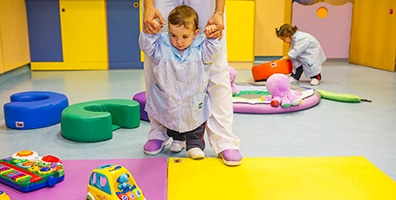
Classrooms
Dining room
Own kitchen. Lunch time is from 12:15h to 13:15h and afternoon snack at 16:15h.
The meal consists of a vegetable puree alternating chicken with meat and fish. For dessert they will have fruit compote three alternate days a week and dairy products on the other two days.
We adjust the feeding of our students to each of the individual needs that arise: Celiac, allergies, intolerances . .. We maintain the guidelines required by pediatricians to correctly diagnose all types of anomalies related to food.
Since we have our own kitchen, the adaptation to any circumstance that may arise is immediate, being able to change the menu of a student (menu - diet) at the same time of going to the dining room if requested by the tutor.
Every day the students take a report home detailing how the student has performed the basic processes, such as: eating, napping, etc....
Rest
- There is a mat assigned to each student from the beginning to the end of the course and always the same one. They are identified with their name, group and photo. The sheets will be provided by the school, will be changed twice a week and will be washed in the laundry.
- Because the student is an early riser, he/she will go to a sleep room with an aide when necessary.
Nursery Projects
Language Immersion Program: we approach the English language through games and songs, introducing the language in a natural way. 50% of the weekly schedule is in Spanish and 50% in English.
Musical Stimulation Project, Multisensory Project and Swimming Project: taking into account the evolutionary moment they are living, these projects are very important and will help them to succeed in the conquest of their autonomy.
School Route
From 1 year onwards we offer route service to different points. You can consult them here
All families who have children in both centers (Logos Nursery and Logos International) will be able to access the INTERNAL ROUTE (between centers) for FREE.
My backpack
What do I need to bring to school?
At the beginning of the course:
- 5 T-shirt collar bibs
- Package of diapers
- Pack of wipes
My class backpack:
- Complete change
- Babi (Change)
- Water bottle
- Pacifier (if used)
- Doll or sleep aid (if used)
If it has been necessary to change the student, the backpack will be returned on Friday.
On Wednesday the soiled bib will be turned in and replaced with the one in the backpack.
Diapers and wipes will be replenished when the tutor needs them, always taking into account that they will be replenished one week in advance.
The bibs will remain at the center and will be washed every day in our laundry, at the end of the school year they will be discarded.
My pool backpack (from 2 years old):
- Uniform swimsuit
- Uniform cap
- Flip-flops
- Towel
- Comb or brush
This will only be brought to school on the group's assigned day and will be returned to the parents upon departure because the clothes are wet.
I'm sick: What do we do?
- When a student becomes ill at school, parents will be notified immediately. If he/she has a signed authorization for the antipyretic medicine, he/she may be given the medicine before they arrive to pick him/her up.
- He/she will not be able to return to school until he/she has been fever free and without medication for 24 hours. This protects the student's well being at school and avoids contagion to the rest of the classmates.
- No medication will be administered without the corresponding medical prescription.
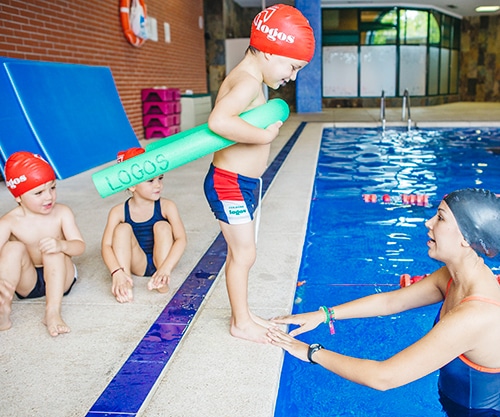
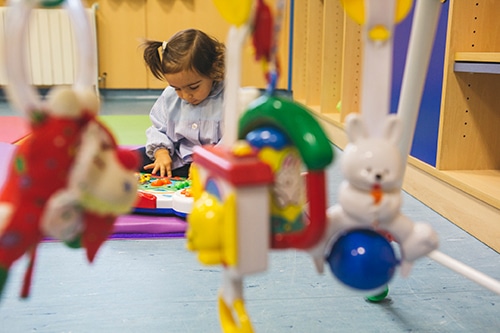
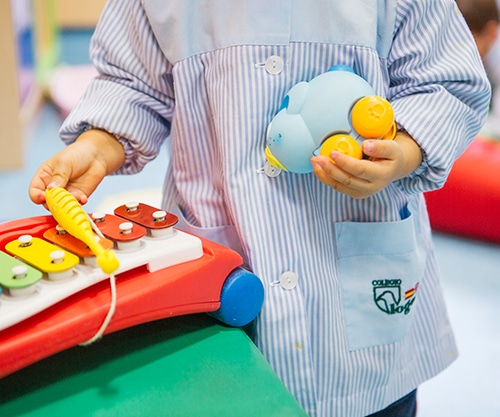
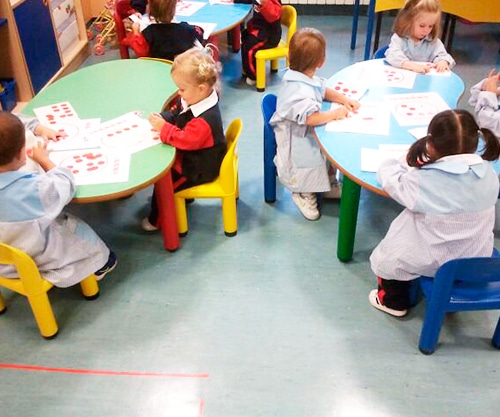
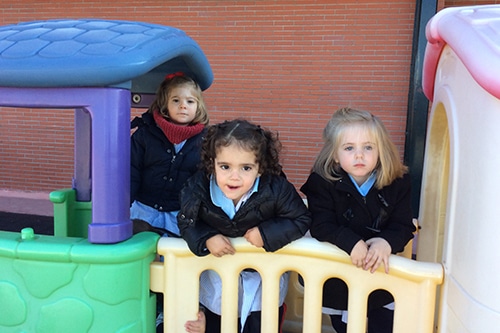
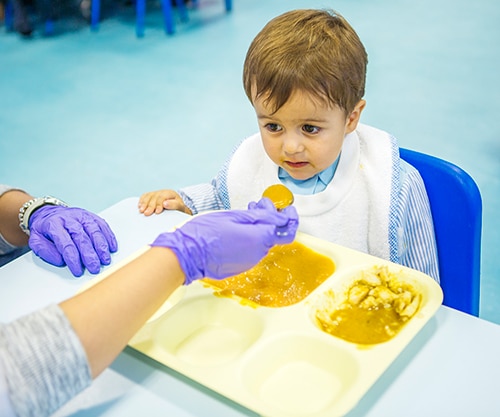
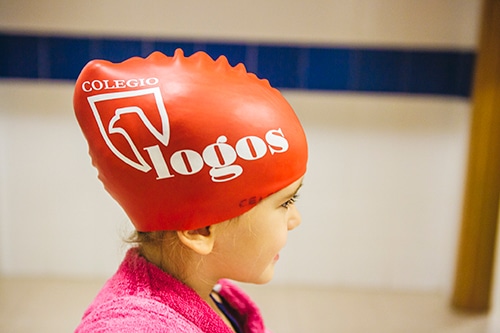
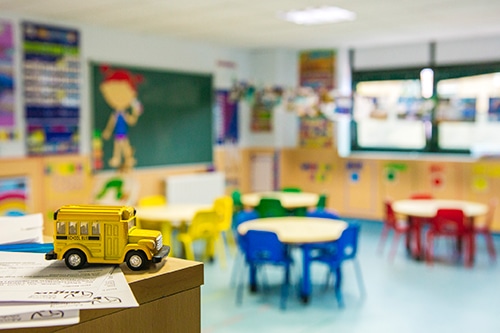
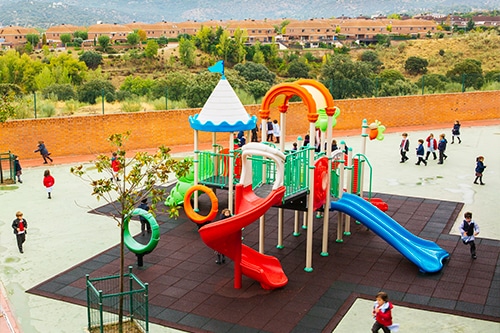
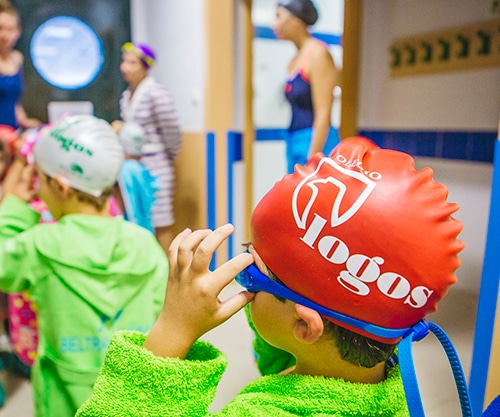
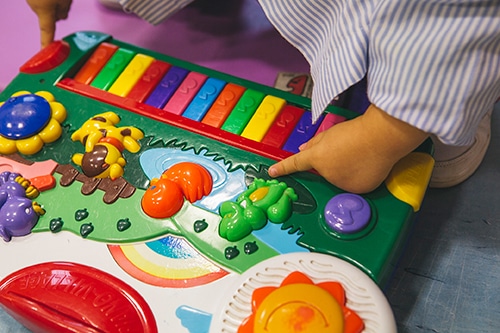
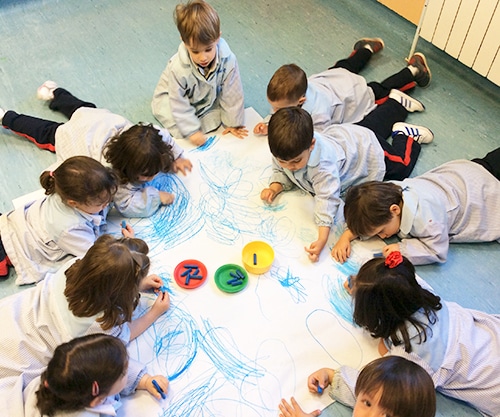
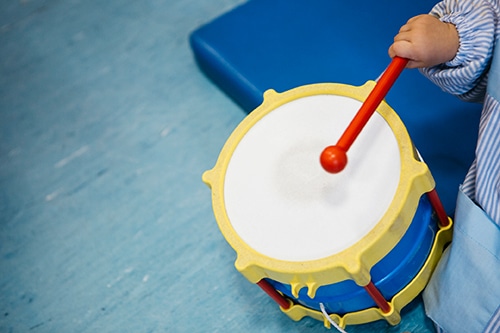
Classrooms
Dining room
Rest
- There is a mat assigned to each student from the beginning to the end of the course and always the same one. They are identified with their name, group and photo. The sheets will be provided by the school, will be changed twice a week and will be washed in the laundry.
- Because the student is an early riser, he/she will go to a sleep room with an aide when necessary.
Nursery Projects
Linguistic Immersion Program: We approach the English language through games and songs, introducing the language in a natural way. 50% of the weekly schedule is in Spanish and 50% in English.
Musical and Psychomotor Stimulation Project and Swimming Project (from 2 years old): Taking into account the evolutionary moment they are living, these projects are very important and will help them succeed in the conquest of their autonomy.
School Route
From 1 year onwards we offer route service to different points. You can consult them here
All families who have children in both centers (Logos Nursery and Logos International) will be able to access the INTERNAL ROUTE (between centers) for FREE.
My backpack
- 5 T-shirt collar bibs
- Package of diapers
- Pack of wipes
My class backpack:
- Complete change
- Baby (Change)
- Water bottle
- Pacifier (if used)
- Doll or sleep aid (if used)
If it has been necessary to change the student, the backpack will be returned on Friday. The soiled baby will be returned on Wednesday and replaced with the one in the backpack. Diapers and wipes will be replaced when the tutor needs them, always keeping in mind that they will be replaced a week in advance. The bibs will remain at the center and will be washed every day in our laundry, at the end of the course they will be discarded. My swimming pool backpack (from 2 years old):
- Uniform swimsuit
- Uniform cap
- Flip-flops
- Towel
- Comb or brush
This will only be brought to school on the group's assigned day and will be returned to the parents upon departure because the clothes are wet.
I'm sick: What do we do?
- When a student becomes ill at school, parents will be notified immediately. If he/she has a signed authorization for the antipyretic medicine, he/she may be given the medicine before they arrive to pick him/her up.
- He/she will not be able to return to school until he/she has been fever free and without medication for 24 hours. This protects the student's well being at school and avoids contagion to the rest of the classmates.
- No medication will be administered without the corresponding medical prescription.













Discover our Nursery Stages

